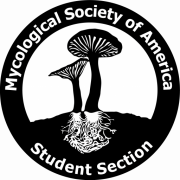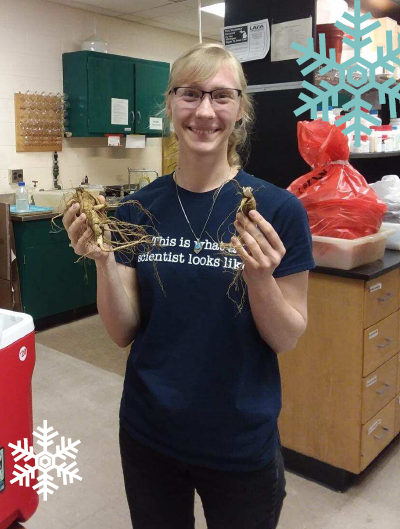
Sara Getson hails originally from State College, Pennsylvania where she received bachelor’s degrees in Plant Science and French Language. She is currently a master’s student in her final year studying under Dr. Mary Hausbeck at Michigan State University.
Tell us about your project!
So, I am really excited to be working on two different crops; Asparagus in Michigan and ginseng in Wisconsin and the Fusarium species affecting these systems. After nearly 30 years since the last survey of Fusarium species found in Michigan asparagus fields, my research is focusing on creating a new baseline for this pathogen for our growers. This is important because asparagus may take 2-3 years of establishment in a field before a harvest may be taken, consequently, if Fusarium isn’t managed effectively, it could mean a significantly reduced yield and revenue for our growers. To do this, I sampled crowns from a variety of growers and cultured them in order to get an idea of what species were present. This data will be able to help researchers focus management strategies on these most prevalent Fusaria. The other portion of my project centers on Fusarium species found in the ginseng perennial system as well. Ginseng is a high value crop and (like asparagus) may take a number of years to fully mature, thus pathogen management from the start is critical. Again, in order to manage this pathogen, we first need a baseline for what we might expect to find and control. This is where my survey project fits in, in order to develop that baseline data.It’s really super exciting to see all of the different morphological structures for each of these species!
Awards you would like to brag about?
I was the American Phytopathological Society National Meeting recipient of the Efrat Gamliel-Atinsky and Joseph P. Fulton Joint Student Travel Award in 2019! I also received a scholarship from the Michigan Vegetable Council in 2018 at the Great Lakes fruit and vegetable Expo and a Beneke Award recipient from Michigan State University Plant Pathology Program in December, 2017 😊
What are your career goals/plans for after you are done with your current
position?
After completing my master’s degree in a vegetable pathology lab, I will be returning home to Pennsylvania to co-manage a fruit farm and get some experience in fruits production in the state! Eventually, my long-term goal is to work for Penn State extension as an extension educator to work collaboratively with the university and with our growers to solve the challenges of the current day.
What is your favorite fungus and why?
My favorite fungus is Armillaria mellea (the honey mushroom!). This one has particular meaning for me since I would go mushroom hunting with my dad since I was pretty young and it is the first one I ever learned how to identify. It’s also super good when cooked well! 😊
What is your favorite fact/thing about fungi?
My favorite thing about fungi is how many roles they can play in our environment, from helping trees and plants to grow better and faster (mycorrhizae), to plant rust diseases with intricate life cycles, to phenomenal decomposers!
Who is your mycology role model?
Hmmmm, this is kind of a tough one… I suppose I would have to go with Gerlach and Nirenberg who compiled incredible illustrations of Fusarium conidia and morphological structures.
Any great stories from field work?
Well, let’s just say that ginseng gardens require rather tall boots 😉
What do you like to do in your free time? What are your hobbies?
Basically everything, haha! I love ballroom dancing, rock climbing, baking, cooking, gardening, mushroom hunting, reading, and a whole host of other things!
Anything else you’d like to talk about?
I really love teaching and it’s been a lot of fun to work with the Midwest Mycology Information program in Michigan to lecture for their mushroom hunting certification courses. This program is the first of its kind and helps to better inform those who wish to collect wild mushrooms and sell to restaurants and farmer’s markets for example!


Leave a Reply